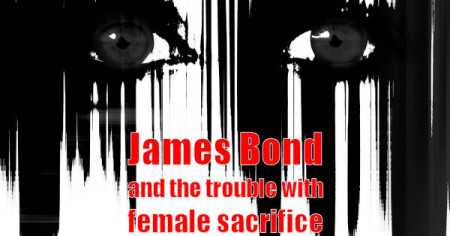“The job’s done; the bitch is dead.”

James Bond’s pain over Vesper Lynd’s betrayal and suicide is palpable in the report he makes to M in the final minutes of Casino Royale (2006). The death inextricably alters Bond so-much-so the event is as important to the genesis of Bond’s character as the two sanctioned kills that won him his coveted double-O status.
Vesper’s death is more complex than a mere plot twist: she dies, not only because the genre’s moral code requires such an end for a traitor, but because only through her death is Bond set free from the emotional ties that would diminish his effectiveness as a double-O. Vesper’s death forces Bond to bury his emotions and vulnerabilities deep in his core and focus on the mission at hand. Her death is, for all intents and purposes, a classic element of female sacrifice.
The motif of female sacrifice is as old as the written word. Most cultures recognize the tropes of female sacrifice where women suffer while putting the needs of others ahead of their own well-being. Particularly strong is the sacrificial icon of women dying during childbirth. But through such selfless acts is the survival and growth of the community ensured.
The Bond movie canon pulls deeply from this iconography. Bond is continually shaped by the sacrifices made by many women.
Alongside the death of Vesper, the deaths of Tracy, (OHMSS), and, possibly, M (Skyfall), are vital events in Bond’s growth and effectiveness as an agent. We know, too, why Bond can’t or won’t make a lasting emotional attachment to other women when he continues to carry the memories of Vesper and Tracy in some armored chamber of his heart.
We understand the revenge motive that drives him. We even emphasize with him as these characters were as fully developed and well-rounded as the character of Bond himself making their loss more tangible. It is clearly evident, therefore, that the deaths of Vesper and Tracy are intrinsic to Bond’s continued character development and in providing plot points that transcend any one movie. They are part of the Bond saga.
There are other deaths that are, perhaps, also necessary for plot development as they stoke the fires of Bond’s desire for revenge. Such losses drive him to almost super-human levels of mission endurance. The deaths of Jill Masterson in Goldfinger, Paula Caplan in Thunderball, Aki in You Only Live Twice, Plenty O’Toole from Diamonds Are Forever, Andrea Andres in The Man with the Golden Gun, the Countess Lisl from For Your Eyes Only, and Paris Carver in Tomorrow Never Dies add a deeply personal dimension to Bond’s missions.
Indeed, Bond completes many of his assignments through a visceral desire to avenge the death of a lover, friend, or colleague rather than through a blind adherence to “Queen and Country.”
Troublingly, however, are the deaths of innocents and colleagues. And, there a many of these, running from the murder of Strangways’ secretary in Dr No, Tilly Masterson in Goldfinger, Moonraker’s Corinne Dufour, Strawberry Fields in Quantum of Solace, Solange in Casino Royale, to the execution of Sévérine in Skyfall.
These women’s deaths serve only to further illustrate the moral turpitude of the villains. But these, and similar deaths, are unnecessary for they occur well after a villain’s venality has been well established. These deaths, therefore, beg the question whether these women, who are generally poorly developed and almost cardboard characters, have to die for the sake of plot momentum?
Without question, however, is the fact that number of female deaths is troubling – something the series itself recognizes in Goldeneye with Alec Trevelyan’s asking of Bond “if you find forgiveness in the arms of all those willing women for all the dead ones you failed to protect”.
Although the female body-count is substantial, not all of the sacrificial women pay with their lives. Many of the female characters have been so badly treated by men that the physical and psychological scars of abuse are clearly evident.
Indeed, the first major female character we’re introduced to, Honey Rider Dr No, was raped as a teen and carries the psychological scars of that attack (and, in the novel, the physical scars via a disfiguring broken nose.)
It’s as if these women have been sacrificed to the baser male motive that has made them easy prey to the villains or distressed damsels in need of saving. Even taking into the misogyny inherent in the source material, the list of the Bond women who have been sexually abused is long and troubling from Honey, Tiffany in Diamonds are Forever, Pussy in Goldfinger, Domino from Thunderball, Camille in Quantum of Solace, and Sévérine to name the obvious.
These women’s backstories are, at times, important to plot development but do their stories have to be so rooted in violence against women?
The demise of both good and evil characters is often important to the movie’s trajectory and can be intrinsic to the plot and add an extra depth of verisimilitude. But, sometimes there are questionable reasons as to why a character has to die.
Bond’s cultural influence is pervasive and global with more than half the world’s population aware of who and what he is. This is an incredibly powerful and influential position for EON to be in. With violence towards women reaching epidemic proportions, it is perhaps time for EON and the Bond scriptwriters to use that global reach and influence for good and re-examine and tone down, at the very least, the role played by violence against women in future James Bond plots.
Julian Parrott has been a James Bond fan ever since his parents took him to the cinema to see Diamonds are Forever. He’s currently a US university administrator who gets to teach a course on James Bond and Social Change for incoming first year students.











June 23rd, 2015 at 17:31
Paralleling these sacrifices are the cases where a woman on the ‘wrong’ side is killed in conflict with Bond. These women are subject to the same hazards of the profession as men. Sticking to the movies, sometimes Bond is the cause but doesn’t deliver the strike, as with Fiona Volpe. Other times a woman on Bond’s side does the deed as with Rosa Klebb. Rosie Carver is forced by Bond to run to her almost certain death. Does Bond actually kill a woman besides Elektra King? I’m not clearly recalling any besides these four.
June 23rd, 2015 at 21:52
Part of the scumminess of the bad side is their treatment of women. But what about the women firmly on the bad side? They are often better developed than some of the cardboard male villains. They might be subject to the same hazards of the profession as the men but Bond rarely kills them outright. Irma Bunt survives OHMSS. Bond maneuvers some to their deaths: Fiona Volpe and Rosy Carver. He fights but doesn’t deliver the fatal blow: Rosa Klebb. He kills an armed hench-woman at a distance: Naomi in Spy, just like the other chasing baddies. The one he kills when not under threat is Elektra King: She’s a prime villain and knows it’s Bond’s duty to kill her but thinks his scruples and desire will prevent it.
I probably missed some. Miranda Frost’s story isn’t clear enough in my mind to describe how Bond discovered her treachery and aimed the empty gun at her. She is later killed by Jinx one-on-one.
June 27th, 2015 at 16:55
Removing violence against women might be a good idea, or it might do them a disservice. After all, it might be taken as the writers trying to hide something that should not be hidden.
Also, the issue of Bond taking to bed someone who has been abused sure sounds like a continuance of that abuse, doesn’t it? plus, it also is “gross”. Like in Skyfall, when he beds a woman who has a long history of prostitution. Talk about “sloppy seconds” if you’ll allow me to be so crude! (that’s OK, we’re all adults here. I hope!)